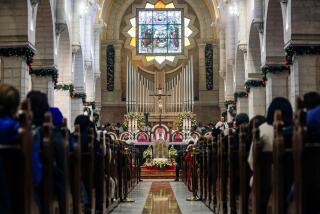On a Morning Just Like This . . .
I’m always struck, every Easter, as we read the familiar story, by the role of the women. In Jesus’ day, women were third-class citizens at best. But Jesus didn’t keep score the way other folks did.
There were women who were followers, women who served as disciples, women who seemed to understand the message when the men could not or would not.
Third-class citizens, at best, but . . .
On a morning just like this,
the women came.
They came with eyes
red and burning
from too many tears,
too much pain,
too little hope.
While the men cowered
in hideaway rooms,
the women,
in spite of their own grief and fear,
came.
Their hope,
their dreams,
had been cruelly slashed,
ripped apart with the lash,
punctured with the thorns,
nailed to the cross,
dead and buried.
They had loved
just as much,
perhaps more,
they had walked
and talked with him
and his willingness
to treat them
as Children of God
must have made him
even more special to them.
They were the oppressed,
along with the sinners
he seemed to love.
But now their hopes had died with him.
But, they came--anyway.
The men might win the races.
The men might push forward,
to stand before the master
in the front rank.
But the women came--
they endured.
Jesus had given them hope,
a faint hope that they could do more,
be more,
be real people,
not just beasts of birth and burden.
To them fell the job of
holding it all together
and so . . .
they were used to pain,
they knew the heartache
of burials come too soon,
of life denied,
of hope flayed
on the altar of tradition
and hate and fear.
The return to reality must have
felt like the knell of eternal doom.
Their hopes must have seemed
so stupid,
so useless,
so doomed.
And so . . .
they didn’t notice
the dull ache in their legs from
too little rest and
too much labor.
Their hearts were numb and their
spirits broken.
But, they came anyway,
on a morning just like this.
In spite of all the crushing
judgment of their world,
they held on
to the God-given values of honor,
duty
friendship.
And so . . .
they came on a morning just like this.
They came to anoint,
to care for the body of their friend.
They couldn’t make grand speeches,
yell at the Sanhedrin,
curse at the Sadducees,
stick a dagger into a Roman.
There was so much they
couldn’t do.
But they could deal with reality
and accept and survive.
There was much they couldn’t do . . .
but, they could come,
in the cool and damp
of a fragrant spring morning,
to the tomb,
to anoint
the body of their friend,
on a morning just like this.
They could lay aside their fear,
forget the demands of pride and place--
for they had so little.
They were numb, but they came
in the cool of a spring morning,
flowers and fresh breezes,
all around them--unnoticed.
For their hearts were numb.
They knew they might
have to wait.
They could not roll away the stone.
They would have to have help for that.
They would do their duty,
serve as they could serve and,
if it all came out all right,
they would not be too late
to do their chores
at home.
They had much to do . . .
but still they came.
As early as they could,
in the soft light of dawn.
It was not a job
for the heat of the day.
And they had much else to do,
but still they came.
It would have been cool
and perhaps damp
in the very early morning.
The fog hung in the low spots
so they didn’t see,
didn’t see until they were there,
right there at the tomb.
In the midst of death
all around them,
they saw the stone.
A grave was an unclean place,
not a place a person wanted to be,
it was unclean
and ritual cleansing
would be necessary
before they could
resume human contact.
But they gained
a moment of time
when they saw . . .
saw the stone
rolled away,
exposing the deep
darkness within.
Their feet forgot to move,
the ache of soul-deep sorrow
stopped them in their tracks.
They looked at the stone,
at the hideous darkness
of the open tomb.
An open tomb,
an unclean body
waiting within,
a body that had been there
since Friday.
But, still,
he was their friend,
their Rabbi,
their Lord.
And, at least
the stone was rolled away.
It should have been a wonder,
a mystery,
an anxiety,
but they were beyond
all that.
It simply was.
The stone was
rolled away.
Thank God for small blessings,
praise be to God.
They remembered to
thank God
for this blessing,
for the little things
that made life go a little better.
Even though this blessing
hastened a moment they dreaded.
With a sigh of hearts
breaking anew
and of soul deep weariness,
they trudged up,
up the little slope,
up to the darkness that awaited,
up to the job they hated to do.
And then,
a great hinge swung,
and reality was forever altered because the women took . . .
a step within,
and their senses swam,
their eyes were blasted with wonder,
their ears rang,
their minds reeled--
they felt the words,
eternal words,
“not here--raised--gone before.”
We cannot capture that moment
in mere words.
We speak of angels,
of shining young men.
We use hopelessly
mundane and limited words
to try to describe
what is indescribable.
What eyes
could not comprehend,
what ears could not hear,
they saw in their souls
and heard in their hearts,
and a wild surge lifted them
leaping, singing
with incredible joy.
And they knew,
for they were washed,
washed in a
moment of eternity.
How to describe that
moment of God-time?
They had stumbled into glory,
walked into God-space,
into heaven touching Earth,
into a wonder,
the wonder.
The wonder of forever.
On a morning,
a morning just like this.
And thus it was then
and thus it still is.
For God, our God,
is Lord of life and death.
For God,
our God,
is free.
Free before to create,
free then to create,
free now to create,
forever free.
We touch reality
with only a tiny fraction
of our senses.
We know so little.
But, we know this,
this we know . . .
the hand that
created life in the first place
reached out and created life
in the second place.
New life,
eternal life,
on a morning,
a morning just like this.
Amen.
*
The Rev. Martin will lead Easter services at 6:30, 8:30 and 10:15 a.m. at Shepherd of the Hills United Methodist Church, 26001 Muirlands Blvd., Mission Viejo.


